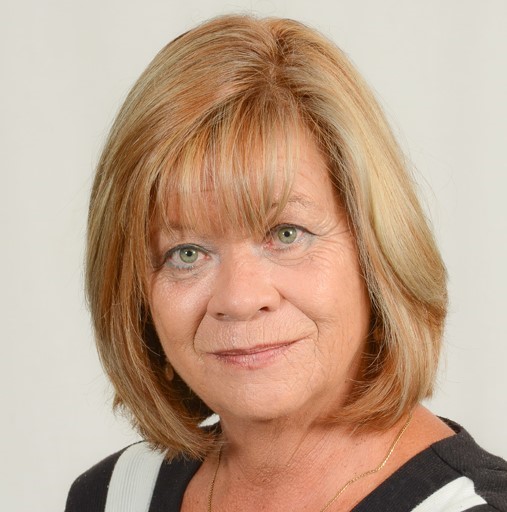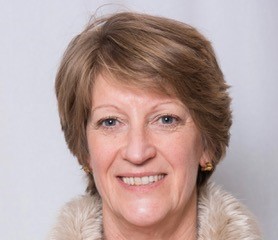The IABC Fellow designation is the highest honor IABC can bestow upon a member. Becoming an IABC Fellow signifies a body of achievement by a communicator who has made a significant impact not only on their organization and IABC, but also on the communication profession itself.
To learn more about the designation, we connected with the three members of the IABC Fellows Class of 2021: Stephanie Griffiths, Jane Mitchell and Caroline Sapriel. These new fellows share insights about the importance of cross-functional collaboration in the communication profession, as well as the ideal qualities for a Fellow submission.
How does the IABC Fellow designation advance a communication professional’s career?
Stephanie Griffiths, IABC Fellow (SG): To be honored with a Fellow designation from IABC constitutes recognition, or perhaps acknowledgement, of one’s professional endeavor from a leading international organization with an established track record and exceptionally high standards. This would certainly create confidence in the communicator’s ability to deliver best practice solutions, very much in the same way as being accredited by the association.
Jane Mitchell, FRSA, IABC Fellow (JM): I’m not sure that it does do that. It’s an immense honor and perhaps does more for one’s reputation. Although as a Fellow, I do feel more confident to pursue pastures new! Having only been anointed in 2021, it might be too early for me to tell. I’ll get back to you on that!
Caroline Sapriel, IABC Fellow (CS): It’s the ultimate recognition by the best in the profession — a truly meaningful honor.
Think back on a situation or project that you are most proud of. Describe the project and your role in it as a communication leader. How did this work impact the profession?
SG: Having been in professional practice for more than 30 years, this is a tough one to answer. I have been exposed to many cutting-edge projects by the clients I have been privileged to serve over the years, so I am reluctant to name any single one. I think, though, that the projects I have undertaken applying communication as a catalyst in organizational development — from constituent and diagnostic research through conflict resolution and change management to leadership development — have demonstrated the role that communication can play throughout any organization. My role has been as an external consultant, and I have been privileged to work across industry and parastatal sectors where my clients have been receptive to this approach.
JM: I’m reflecting on a corporate values rollout for a global public services sector provider. With involvement and support from the top of the organization to the front line, we developed a powerful program that embedded values into systems and processes while enabling a selection of face-to-face interactions to embed the values into the heart, body and soul of all employees. The project has become a model of how to strategically align words with behaviors and actions.
CS: The launch of CS&A’s “10 Commandments of Crisis Management,” which won a Gold Quill in 2011 on the occasion of our 20th anniversary, was such a moment. Our ability to capture best practice crisis management and communication via 10 commandments that are easy to follow and refer to summarizes our expertise in the subject matter. CS&A’s “10 Commandments of Crisis Management” continue to receive recognition and feedback across fellow communication professionals and crisis management practitioners globally.
Recent IABC research shows that communication professionals are most likely to thrive when they are knowledgeable about multiple business functions within their organizations. As a Fellow, how do you demonstrate this cross-functional skill in your practice?
SG: The work that I have done with our national Standards Generating Body and as an external advisor on tertiary curricula has always stressed the importance of acquiring skills in associated disciplines, such as research and organizational development. The communicator has the capacity to make a very real difference if they are willing to function as a multi-disciplinary professional.
JM: IABC is an exemplar of creating connection across the world. Being an IABC Fellow, doesn’t make any difference to how I demonstrate this skill. That skill is a contributory factor to becoming a Fellow and being a member of IABC. I think it is in our DNA to connect across organizations and communities. I have a phrase that has kept me honest since I was a fledgling communication professional, and that is to “join dots.” It is crucial that we do it in all aspects of our work.
CS: The IABC Fellow designation is like a badge of credentials that raises the individual’s profile and credibility in the organization across functions. Equally, to be named a Fellow, one must demonstrate a solid grasp of business beyond the realm of the communication profession to drive change and results as a communicator.
Share one piece of advice for those considering nominating a communication professional for the IABC Fellow designation. Why take advantage of this distinguished opportunity?
SG: There are many deserving practitioners who work without recognition and very often in isolation. I would ask myself what the potential candidate has demonstrably — and preferably quantifiably — contributed to the standards of practice. And as so many people have contributed so much, how do we identify and acknowledge these true professionals?
JM: There is every possibility that an IABC Fellow designation will open doors to help today’s society. It needs all the help it can get — we need to rebuild communities and people’s sense of well-being. To do that, we need to rebuild trust across the world. If communicators and communication cannot do that, what are we doing? This is an opportunity to pay back and be a force for good.
CS: The communication profession still suffers from a lack of “official” recognition among other disciplines and business/corporate functions. The IABC Fellow designation affords a valuable level of professional recognition which is an opportunity that should not be missed in the communicator’s career.
If you or a colleague has made an outstanding contribution to the communication profession and has provided selfless service to IABC and its members, consider submitting a nomination by Friday, 29 October. Review the 2022 Nomination Guide, and submit your recommendation here.
Featuring Jane Mitchell, FRSA, IABC Fellow; and Caroline Sapriel, IABC Fellow Serving as the first IABC IEB Chair not to come from the U.S. or Canada is just one milestone in Stephanie Griffiths’, ABC, IABC Fellow, varied and remarkable career. Griffiths’ early experiences in journalism, behavioral research, human resources and organizational development provided the foundation for contributions to the corporate communication industry in South Africa and across the globe. Griffiths is the founder and senior partner of Cohesion, a 30-year-old, full-service communication, behavioral research and development consultancy. Her work on behalf of clients has gained international recognition, and she has received numerous national and global awards. In additional to her precedent-setting service as IABC IEB Chair, she served as president of the then-South African chapter, was a delegate-at-large on the EMENA Board and the IEB. She led several strategic initiatives during her tenure, as well as being a trustee of the Research Foundation and a long-time judge of the Gold Quill Awards.
Serving as the first IABC IEB Chair not to come from the U.S. or Canada is just one milestone in Stephanie Griffiths’, ABC, IABC Fellow, varied and remarkable career. Griffiths’ early experiences in journalism, behavioral research, human resources and organizational development provided the foundation for contributions to the corporate communication industry in South Africa and across the globe. Griffiths is the founder and senior partner of Cohesion, a 30-year-old, full-service communication, behavioral research and development consultancy. Her work on behalf of clients has gained international recognition, and she has received numerous national and global awards. In additional to her precedent-setting service as IABC IEB Chair, she served as president of the then-South African chapter, was a delegate-at-large on the EMENA Board and the IEB. She led several strategic initiatives during her tenure, as well as being a trustee of the Research Foundation and a long-time judge of the Gold Quill Awards.
 Working with organizations to develop vibrant, ethical cultures, Jane Mitchell, FRSA, IABC Fellow, has made extraordinary contributions to clients, to IABC and the future of the profession. After beginning her career at the BBC in London, Mitchell has advised a range of companies including Rolls-Royce, BAE Systems, BP, Tesco and Airbus. She supports organizations in exploring and uncovering their values, assessing the state of their ethical culture, developing Codes of Ethics and creating communications and engagement strategies to ensure they are successfully embedded. She leads her own consultancy, JL&M, and is also a non-executive director of Karian and Box, a UK-based engagement agency. Mitchell has been a leader within IABC, serving as a member of the IEB, heading the international Ethics Task Force and drafting modules for certification programs, among many responsibilities. She was the 2021 chair of the Program Advisory Committee.
Working with organizations to develop vibrant, ethical cultures, Jane Mitchell, FRSA, IABC Fellow, has made extraordinary contributions to clients, to IABC and the future of the profession. After beginning her career at the BBC in London, Mitchell has advised a range of companies including Rolls-Royce, BAE Systems, BP, Tesco and Airbus. She supports organizations in exploring and uncovering their values, assessing the state of their ethical culture, developing Codes of Ethics and creating communications and engagement strategies to ensure they are successfully embedded. She leads her own consultancy, JL&M, and is also a non-executive director of Karian and Box, a UK-based engagement agency. Mitchell has been a leader within IABC, serving as a member of the IEB, heading the international Ethics Task Force and drafting modules for certification programs, among many responsibilities. She was the 2021 chair of the Program Advisory Committee.
 An internationally recognized risk, crisis and business continuity expert, Caroline Sapriel, IABC Fellow, has advised global companies, co-authored two books and contributed to numerous IABC initiatives while living in different regions. While working for Hill & Knowlton in Taiwan in 1987, Sapriel became the first IABC member in the country. In 1991, she founded CS&A in Hong Kong to provide customized risk, crisis and business continuity services to multi-national clients across all industries. She has designed training programs for consultancy teams, clients’ in-house communications staff and corporate executives around the world. Sapriel was a founding member of IABC’s Ethics Committee, a contributor to the redrafting of the Ethics Code, a judge for the Public Affairs Asia Awards, a member of the Program Advisory Committee, a Gold Quill winner and an author in IABC’s Handbook of Organizational Communication (2nd Edition). She works with IABC members and chapters around the world, sharing best practices in risk management and crisis communications. Sapriel is fluent in French, English, Spanish, Hebrew and Mandarin, and holds a BA in Chinese studies and a BSc in international relations from the Hebrew University of Jerusalem.
An internationally recognized risk, crisis and business continuity expert, Caroline Sapriel, IABC Fellow, has advised global companies, co-authored two books and contributed to numerous IABC initiatives while living in different regions. While working for Hill & Knowlton in Taiwan in 1987, Sapriel became the first IABC member in the country. In 1991, she founded CS&A in Hong Kong to provide customized risk, crisis and business continuity services to multi-national clients across all industries. She has designed training programs for consultancy teams, clients’ in-house communications staff and corporate executives around the world. Sapriel was a founding member of IABC’s Ethics Committee, a contributor to the redrafting of the Ethics Code, a judge for the Public Affairs Asia Awards, a member of the Program Advisory Committee, a Gold Quill winner and an author in IABC’s Handbook of Organizational Communication (2nd Edition). She works with IABC members and chapters around the world, sharing best practices in risk management and crisis communications. Sapriel is fluent in French, English, Spanish, Hebrew and Mandarin, and holds a BA in Chinese studies and a BSc in international relations from the Hebrew University of Jerusalem.